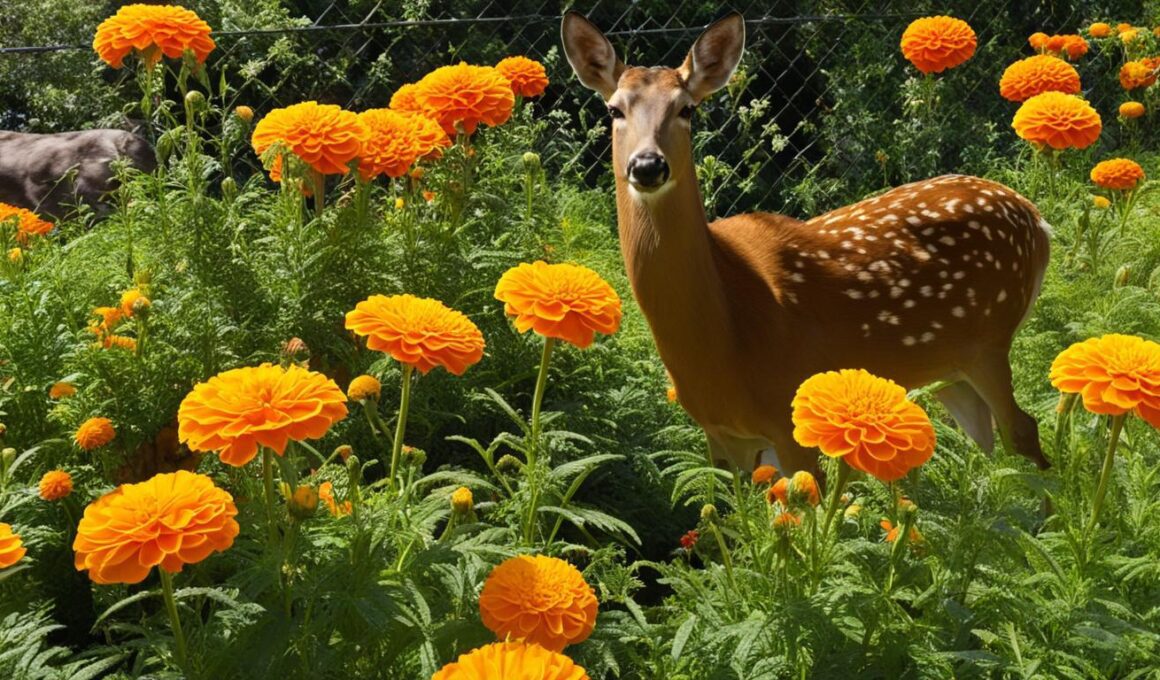Are you worried about deer munching on your precious marigolds? Wondering if those gardening myths you’ve heard are true? In this article, we’ll debunk the common myth that deer eat marigolds and provide you with valuable insights on how to protect your garden from these curious creatures.
Contrary to popular belief, deer are actually uninterested in marigolds. While they may nibble on young marigold plants, mature marigolds are generally safe from their grazing. However, marigolds have long been used as a natural deer repellent due to their strong fragrance and bright colors that can scare away potential prey from a distance.
Marigolds contain natural toxins that deter deer from feeding on your plants. As a gardener, you can strategically protect your garden by growing marigolds close to water sources or in areas with plenty of cover options for the deer. Another effective measure is to erect a fence around your garden, keeping the deer out and preserving the beauty of your flower petals and foliage.
So, put those worries to rest. Deer may not have a taste for marigolds, but by using them strategically, you can still protect your garden from these graceful yet potentially destructive creatures. Stay tuned for more tips on safeguarding your garden from deer and debunking common gardening myths.
How to Protect Your Garden from Deer
Deer can be a common sight in many parts of the United States and can cause damage to gardens by eating plants and flowers. To protect your garden from deer, there are a few things you can do.
- Keep your landscaping well-maintained: Maintaining a well-manicured yard will make it difficult for deer to find tasty plants to eat. Regularly trim shrubs and trees, remove fallen fruits, and keep grass cut short to discourage deer from entering your garden.
- Use barriers: Creating a physical barrier between your garden and deer territory can be an effective way to protect your plants. Consider installing a fence around your garden, making sure it is at least 8 feet tall to prevent deer from jumping over. Alternatively, plant tall shrubs or use netting to create a barrier.
- Plant deer-resistant varieties: Deer have certain plants they prefer to eat, so planting varieties that deer don’t particularly enjoy can help deter them. For example, marigolds are known to be unpopular with deer and can serve as a natural deterrent. Planting them strategically in your garden can help protect other plants from being devoured.
By implementing these tips, you can safeguard your garden from deer without harming them or resorting to traps. Remember, protecting your garden is possible with some thoughtful planning and proactive measures.
What Deer Eat and How to Protect Your Garden
Deer are herbivores and primarily eat plants. They have a wide-ranging diet, but their preferences often lean towards aquatic or moist plants over dry ones. Some of the typical plants that deer consume include:
- Clovers
- Dandelions
- Carrots
- Beets
- Marigolds
However, it’s worth noting that marigolds contain high levels of a compound called volatile terpenoids, which are attractive to deer. This makes marigolds particularly vulnerable to deer damage, even though they are not a deer’s first choice. As a gardener, it’s essential to take steps to protect your flowers from these hungry critters.
To protect your garden from deer, you can employ a few strategies. One effective method is to grow marigolds close to water sources or plant them in areas that provide plenty of cover options for the deer. This way, deer may be less inclined to approach your marigolds.
Another practical approach is to erect a fence around your garden. A sturdy fence acts as a barrier, preventing deer from accessing your garden and scavenging flower petals and foliage. This physical barrier can significantly reduce the chances of deer damage.
Remember, protecting your garden from deer requires understanding their diet and behavior. By considering their preferences and implementing these protective measures, you can safeguard your garden and enjoy a beautiful, flourishing space.
Will Planting Marigolds Also Protect My Garden from Deer?
Planting marigolds can help protect your garden from deer eating impatiens. Their strong scent can act as a deterrent for deer. Other safety tips include using fences and repellents to keep deer away from your garden. Be sure to research the best methods for your specific area.
Conclusion
In conclusion, it is a commonly held misconception that deer eat marigolds. However, these graceful creatures are actually uninterested in these vibrant flowers. Instead, they are more likely to nibble on young plants rather than mature ones. Despite this, marigolds have been used as a natural deterrent for deer for hundreds of years, thanks to their strong fragrance and eye-catching colors.
To effectively protect your garden from deer, consider planting marigolds close to water sources or in areas with ample cover options for the deer. The distinctive scent and visual appeal of marigolds can help deter these animals and keep your garden safe. Another effective method of garden protection is erecting a fence around your garden, creating a physical barrier that prevents deer from accessing your precious plants.
By following these strategies and dispelling common myths, you can successfully safeguard your garden from deer and enjoy the beauty of marigolds and other flowers without worry. Whether you choose natural repellents like marigolds or physical barriers such as fences, taking proactive steps to protect your garden will ensure that it thrives and flourishes for years to come.









